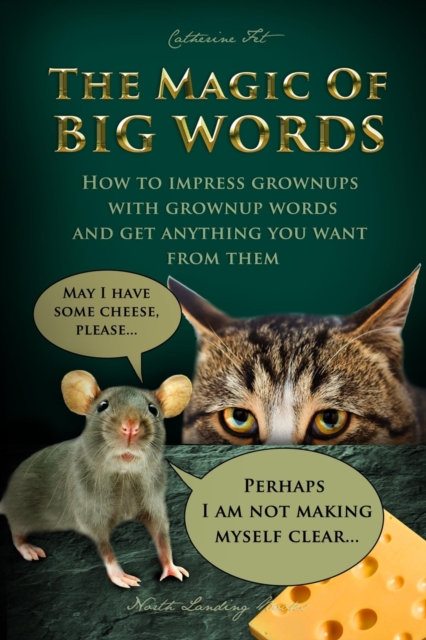The Magic of Big Words: How to impress grownups with grownup words and get anything you want from them: Social skills, social rules, talking a

The Magic of Big Words: How to impress grownups with grownup words and get anything you want from them: Social skills, social rules, talking a
'Teach your teddy bear good manners'...yawn.
My kid - and maybe your kid, too - doesn't mind if his teddy bear is rude, but he doesn't like losing in a negotiation, and he wants to be taken seriously by grownups, and that's where the real opportunity is hiding.
Let's explain to our kids that being strategic and diplomatic in their speech and polished in their manners attracts a special trust from grownups, and pays off big time in ice creams, movies, robots, unicorns, and other objects of desire.
With my kid, abstract concepts such as being nice to your teddy bear for the sake of human decency, simply don't work. So I have no qualms about telling him: Learn to talk to me like a well-mannered grownup, and I will oblige you with the stuff that you want.
I also wrote this book from the perspective of being on the kid's side. The book is not didactic, it doesn't lecture about polite speech or manners, it treats these things as currency in getting what you want, and we make fun of grownups here and there in a good-natured way.
The Magic of Big Words is an independent reading book for kids ages 7-11 (about level 4-5). The goal of the book is to
- expand our kids' vocabulary in the grownup direction; - teach (or polish) polite and diplomatic communication with grownups; - teach that quality and responsibility in communication gets results; - introduce the concept of style, and develop interest in learning about style and the history of languages.
What are 'big words'? To explain we compare everyday (or kids') speech made mostly of short words of Germanic origin with educated, grownup speech sprinkled with the post-Norman-Conquest French-Latin 'big words' (like 'appreciate, ''reasonable, ' or 'consequences'). To introduce this idea we'll learn about William the Conqueror, the Norman invasion and the battle of Hastings, and compare two versions of the same story - A written in everyday language, and in the literary 'big words' language.
Then we'll explore being diplomatic in our speech: How diplomats communicate and how to turn up the volume of politeness to get the grownups to YES (when 'please' is not enough). In this part we'll cover ultra-polite ways to
- ask for help or things - ask for permission to speak - disagree - express displeasure - say NO diplomatically - soften your speech stylistically to prevent defensiveness - give diplomatic advice - use euphemis
PRP: 85.17 Lei
Acesta este Prețul Recomandat de Producător. Prețul de vânzare al produsului este afișat mai jos.
76.65Lei
76.65Lei
85.17 LeiLivrare in 2-4 saptamani
Descrierea produsului
'Teach your teddy bear good manners'...yawn.
My kid - and maybe your kid, too - doesn't mind if his teddy bear is rude, but he doesn't like losing in a negotiation, and he wants to be taken seriously by grownups, and that's where the real opportunity is hiding.
Let's explain to our kids that being strategic and diplomatic in their speech and polished in their manners attracts a special trust from grownups, and pays off big time in ice creams, movies, robots, unicorns, and other objects of desire.
With my kid, abstract concepts such as being nice to your teddy bear for the sake of human decency, simply don't work. So I have no qualms about telling him: Learn to talk to me like a well-mannered grownup, and I will oblige you with the stuff that you want.
I also wrote this book from the perspective of being on the kid's side. The book is not didactic, it doesn't lecture about polite speech or manners, it treats these things as currency in getting what you want, and we make fun of grownups here and there in a good-natured way.
The Magic of Big Words is an independent reading book for kids ages 7-11 (about level 4-5). The goal of the book is to
- expand our kids' vocabulary in the grownup direction; - teach (or polish) polite and diplomatic communication with grownups; - teach that quality and responsibility in communication gets results; - introduce the concept of style, and develop interest in learning about style and the history of languages.
What are 'big words'? To explain we compare everyday (or kids') speech made mostly of short words of Germanic origin with educated, grownup speech sprinkled with the post-Norman-Conquest French-Latin 'big words' (like 'appreciate, ''reasonable, ' or 'consequences'). To introduce this idea we'll learn about William the Conqueror, the Norman invasion and the battle of Hastings, and compare two versions of the same story - A written in everyday language, and in the literary 'big words' language.
Then we'll explore being diplomatic in our speech: How diplomats communicate and how to turn up the volume of politeness to get the grownups to YES (when 'please' is not enough). In this part we'll cover ultra-polite ways to
- ask for help or things - ask for permission to speak - disagree - express displeasure - say NO diplomatically - soften your speech stylistically to prevent defensiveness - give diplomatic advice - use euphemis
Detaliile produsului










